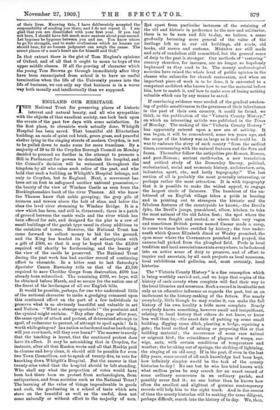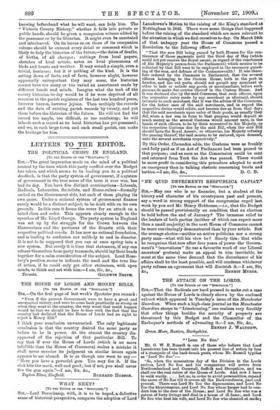ENGLAND OUR HERITAGE.
THE National Trust for preserving places of historic interest and natural beauty, and all who sympathise with the objects of that excellent society, can look back upon
the events of the past few days with some satisfaction. In the first place, to chronicle work actually done, Whitgift Hospital has been saved. That beautiful old Elizabethan building, an oasis of quiet red brick, green grass, and peaceful shelter lying in the ringing streets of modern Croydon, is not
to be pulled down to make room for more tramlines. By a majority of 29 to 25 the Croydon Borough Council on Monday decided to proceed no further in the attempt to promote a Bill in Parliament for powers to demolish the hospital, and the Council's decision will be welcomed throughout the kingdom by all who value such relics of the past, and who hold that such a building as Whitgift's Hospital belongs, not only to Croydon, but to England. Next, a movement has been set on foot to safeguard another national possession,— the beauty of the view of Windsor Castle as seen from the Buckinghamshire bank of the river Thames. All who know the Thames know that noble grouping; the grey pile of terraces and towers above the belt of elms, and below the elms the level river streaming to Windsor Bridge. It is a view which has been, and still is, threatened; there is a patch of ground between the castle walls and the river which has been offered for sale, and designed for the plot is a row of small buildings of the garish type usual in cheap additions to the outskirts of towns. However, the National Trust has come forward to collect money to bid for the ground, and the King has headed its list of subscriptions with a gift of £500, so that it may be hoped that the £3,000 required will shortly be forthcoming, and the beauty of the view of the castle be preserved. The National Trust during the past week has had another record of continuing effort to chronicle. In a letter sent to last Saturday's Spectator Canon Rawnsley tells us that of the £1,100 required to save Cheddar Gorge from destruction, £500 has already been subscribed. The remaining £600, we hope, will be obtained before March, and so secure for the nation one of the finest of the landscapes of all our English hills.
It would be possible, perhaps, for one who understood little of the national character to make a grudging comment upon this continued effort on the part of a few individuals to preserve what is so obviously beautiful and valuable in art and Nature. " What a strange spectacle ! " the pessimist and the cynical might exclaim. " Day after day, year after year, the same cycle of attack and protest, of determined attempt to spoil, of endeavour to protect, of attempt to spoil again ! Is it worth while goingon? Ina nation so hardened and so hardening, will you ever teach, will they ever learn?" The answer is surely that the teaching is learnt, that the continued protest does have its effect. It may be astonishing that in Croydon, for instance, after all that Ruskin wrote and all that Ruskin paid to cleanse and keep clean, it should still be possible for even two Town Councillors, not to speak of twenty-five, to vote for knocking down Whitgift's Hospital. But the answer is that twenty-nine voted that the hospital should be left standing. Who shall say what the proportion of votes would have been had there been no protest from archaeologists, from antiquarians, and from societies such as the National Trust? The learning of the value of things imponderable in goods and cash, the graduating in a school of taste which sets store on the beautiful as well as the useful, does not come naturally or without effort to the majority of men.
Ilut apart from particular instances of the retaining of the old and historic in preference to the new and utilitarian, there is to be seen and felt to-day, we believe, a sense gradually becoming more general of the value of the heritage left us in our old buildings, old roads, old books, old scenes and customs. Mistakes are still made and acts of vandalism still committed, but the general sense of duty to the past is stronger. Our methods of " restoring " country churches, for instance, are no longer so hopelessly haphazard as they used to be. The county archaeological societies have raised the whole level of public opinion in the classes who subscribe for church restoration, and when an important piece of work is to be done, it is entrusted to a competent architect who knows how to use the material before him, how to match it, and how to make sure of losing nothing valuable which can by any means be saved.
If convincing evidence were needed of the gradual awaken- ing of public sensitiveness to the greatness of their inheritance in the past of their own country, it could be found, we think, in the publication of the "Victoria County History," on which an interesting article was published in the Times of Monday. The making of the " Victoria County History " has apparently entered upon a new era of activity. It was begun, it will be remembered, some ten years ago, and the scope of the history was as large as it well could be. It was to embrace the story of each county "from the earliest times, commencing with the natural features and the flora and fauna. Thereafter follow the antiquities pre-Roman, Roman, and post-Roman ; ancient earthworks, a new translation and critical study of the Domesday Survey, political, ecclesiastical, social and economic history, architecture, arta, industries, sport, etc., and lastly topography." The last section of all is probably the most generally interesting, or perhaps rather the most attractive. It is with topography that it is possible to make the widest appeal, to engage the largest circle of listeners. The humblest of the un- lettered of an English village takes a pride in hearing and in pointing out to strangers the historic and the fabulous features of the countryside he knows.—the Devil's dyke, the Devil's jumps, punchbowl, elbow, kitchen, to take the most natural of the old fables first ; the spot where the Danes were fought and routed, or where that very vague and sometimes British person named Caesar made a camp, to come to times better certified by history; the tree under. neath which Queen Elizabeth dined or Wesley preached, the open moor where the Covenanters preached and prayed, the cannon-ball picked from the ploughed field. Pride in local tradition and local associations exists everywhere, to be fostered into an active sense of duty to preserve, and of effort to inquire and ascertain, by all such projects as local museums, local exhibitions and galleries, and, most certainly, local histories.
The " Victoria County History" is a fine conception which is being worthily carried out, and we hope that copies of the history of each county when complete will find their way to the local libraries and museums. Such a record is invaluable not only as an educative influence as regards the past, but as an incitement to the history-making of the future. For nearly everybody, little though be may realise it, can make the full history of his own locality a trifle more complete. Nearly everybody knows something, however small and insignificant, relating to local history that others do not know, or know less well than he,—the exact date of putting up some small building, digging some ditch, planting a hedge, repairing a gate ; the local method of mixing or preparing this or that building material ; the occurrence of some rare animal or migrant bird ; the coincidence of plagues of wasps, ear- wigs, ants, with certain conditions of temperature and weather; the breaking out of springs, the striking of lightning, the singing of an old song. If in the past, if even in the last fifty years, some record of all such knowledge had been kept, how infinitely simpler would be the task of the county historian to-day ! No one but he who has tried knows with what endless pains he may search for an exact record of some ordinary occurrence in an ordinary parish, and possibly never find it ; no one better than he knows bow often the smallest and slightest of genuine contemporary records will help him to the right track. And in due course of time the county historian will be making the same diligent, perhaps difficult, search into the history of to-day. We, then,
knowing beforehand what he will want, can help him. The " Victoria County History," whether it falls into private or public hands, should be given a companion volume edited by the possessor or by its librarian. It might even be annotated and interleaved. On its leaves or on those of its companion volume should be entered every detail or comment which is likely to help the historian of the future,—the dates of deaths, of births, of all changes ; cuttings from local papers, sketches of local artists, notes on loCal phenomena, of birds and beasts and weather. It may sound a simple, even a trivial, business ; but it is nothing of the kind. It is the setting down of facts, and of facts, however slight, however apparently unimportant they may seem, the historian cannot have too many or too varied an assortment made by different hands and minds. Imagine what the task of the county historian to-day would be if he were deprived of all recourse to the parish registers of the last two hundred years, however barren, however jejune. Then multiply the records and the data of existing parish records by twenty, and put them before the historian of the future. He will not find the record too ample, too difficult, or too confusing; he will inherit such a record as no local historian has yet possessed ; and we, in each large town and each small parish, can make the heritage for him.















































 Previous page
Previous page